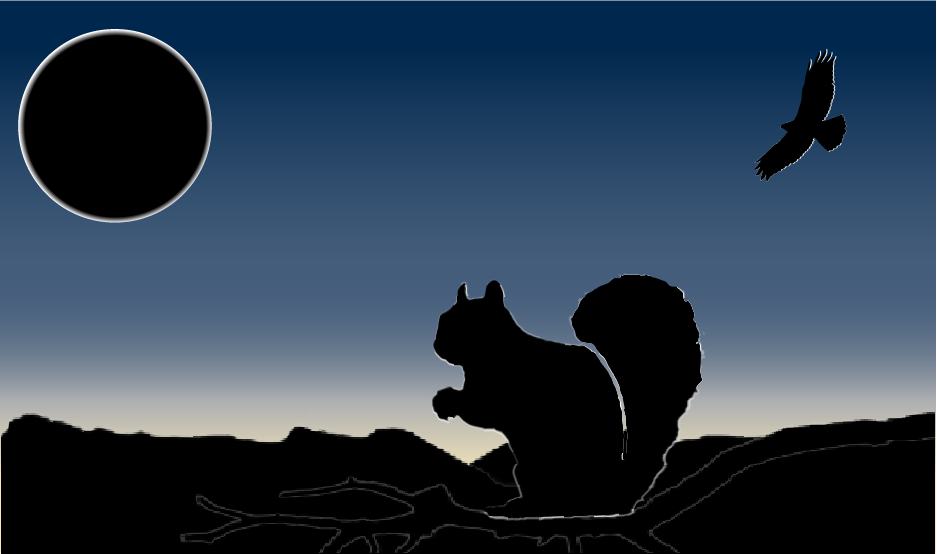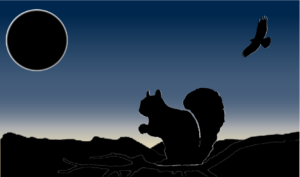

ILLUSTRATION BY ADA JONES
Ada Jones | Staff Writer | ajones7@mail.smcvt.edu
We aren’t the only ones experiencing solar eclipse totality for the first time.
For most of us on campus, experiencing totality will be a first, and for most, it will also be the last time we will experience it. But, the squirrels might not even know it’s happening. So, how will totality impact the animals?
“Short story is nobody really knows,” said Erin Talmage, the executive director at the Birds of Vermont Museum. Totality is a once-in-a-lifetime experience for us and also for most of the animals in Vermont who stay in one location for their whole lives.“It’s really important to remember that we share the planet with more than just people,” Talmage said. We often forget that the animals were here before us, and we are more alike than we think.
Almost all living things have a circadian rhythm, “the 24 hour cycle of day and night and all living things have mechanisms in them that’s basically a time keeper,” said Caren Cooper, a Forestry and Environmental Resources professor at North Carolina State with expertise in participatory sciences. These rhythms are why we get tired at night when our melatonin kicks in and why we wake up in the morning when our serotonin kicks in. “It’s all our neuroendocrine system and it’s all synced to the sun” Cooper continued.
The daylight is why diurnal birds that are active during the day wake up and why the nocturnal birds that are active during the night go to sleep. Totality will last no longer than four minutes and while we’re busy watching a rare phenomenon, the birds will likely be starting their nighttime routine. As for Vermont animals specifically, we have to go off of what has been seen in other parts of the world that have seen solar eclipses. “None of our animals have ever seen one before, they have no way of telling each other about it,” said Toni Mikula while Tiki, her green cheeked conure home office assistant, sat on her head over a Zoom call. Mikula is a Wildlife Specialist at Vermont Fish and Wildlife who has heard from all over the world that some of the animals will assume it’s nighttime, the birds will go silent, and animals will start to make their way back to their homes. The California Academy of Sciences ran a citizen science project in anticipation for the solar eclipse in August of 2017 and found some interesting behavior changes from citizen submitted observations. Ants slowed down or stopped moving which mimicks their behavior during the night, domestic hens gathered together and fell silent while the roosters started to crow during totality.
However, certain animals have heightened senses that could potentially pick up on the eclipse before humans can. For instance, some birds can see ultraviolet light which allows them to see a lot more detail. Chickadees, red-tailed hawks and barred owls are some of the Vermont birds that possess a fourth cone in their eye that allows them to see UV light. How the animals will be impacted is still mostly unknown because solar eclipses and totality are so rare that scientists can’t collect enough data on their own to really understand these things. Cooper, whose area of expertise is in participatory sciences, and Talmage stress the importance of citizen science projects to help scientists further understand these phenomena. So, if you see a squirrel scurrying back up to its home in the branches while the daylight fades to dark make sure to take note.

